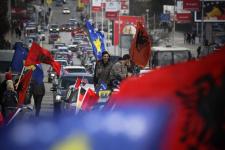 Thousands of Albanians took to the streets with flags and banners to celebrate the first anniversary of Kosovo’s declaration of independence on Tuesday, but excitement was dampened by the realisation that the secession from Serbia was not a quick fix to the nation’s many problems.
Thousands of Albanians took to the streets with flags and banners to celebrate the first anniversary of Kosovo’s declaration of independence on Tuesday, but excitement was dampened by the realisation that the secession from Serbia was not a quick fix to the nation’s many problems.
Car horns, traditional music and roars of happiness echoed through the streets of Pristina, as streets were blocked by hundreds of cars with licence plates from around Europe. Swarms of people from toddlers to grandparents walked around the city carrying the red and black Albanian flag and Kosovo’s new blue-gold flag, as well as flags of Kosovo’s Western allies, the Stars-and-Stripes and Union Jack.
“We are out celebrating independence, it feels great,” said 11-year old Vesa, while Julind from Tirana said he came “to celebrate with our Kosovar brothers on this special day.”
“It is my first time in Kosovo and it’s great. I have great words to tell my friends in Tirana when I get back,” he said, “We are all Albanians!”
Vali Gashi, a Ministry of Education employee, was handing out free Independence t-shirts to children out celebrating in the city.
“The atmosphere is amazing! It is a happy day”, Gashi said.
“I’m here on my first visit to Kosovo, I’m really enjoying the festivities, I’ve never seen so much excitement in such a small place,” said Antonia Harrison from Chicago.
Despite the exuberance of the day, many concede that independence has not brought the many changes needed to really improve the lives of ordinary people in a country were half the population lives under or near the poverty line, many supported by relatives working abroad.
“We came to celebrate Independence, the atmosphere is great. I am not very happy with the government until now, but God willing, (Ramush) Haradinaj will win the next elections and improve our country’s situation”, said Nexhat from Decan.
Kosovo Prime Minister Hashim Thaci and other senior leaders thanked the people for their sacrifices in winning independence from Serbia, and promised that the future would be brighter, with more recognitions of its independence.
“Our first year was a year of pride for Kosovo,” Prime Minister Hashim Thaci told a special parliament session.
“Each citizen should be proud for our achievements. We ratified the most important document of the Republic of Kosovo. Our key success was unity,” he said, adding that the government was working to protect the rights of all citizens and ethnic communities living in Kosovo.
But the 90-percent Albanian majority knows the joy is not shared in Kosovo’s Serb areas. The Serb minority rejects the secession and looks to Serbia as its capital for healtcare, education and administrative support. As Belgrade consolidates its authority over the weak objections of a muddled international administration, the ‘soft partition’ between Serbs and Albanians looks to be getting permanent.
“It is a festive day for the whole territory of Kosovo, I mean the whole Albanian population, since we have waited for this for so long. I believe we are going to celebrate in a dignified way”, said Fisnik from Prizren.
“I hope that Kosovo gets rid of this problem of the north, and the economic situation improves,” said Agron form Pristina. “The government has finished some work but not as much as they should, but we need mobilization and support from the citizens of the country for it to happen.”
While Albanians celebrated, Serb and Kosovo Serb politicians gathered defiantly in the northern Kosovo town of Zvecan on Tuesday to proclaim their rejection of the secession and flaunt Belgrade’s reach in Serb-controlled parts of Kosovo where Pristina has no authority.
“The Assembly of Serbian municipalities in Kosovo and Metohia reject as invalid and without legal validity all acts and undertakings which unilaterally declares Kosovo independence and form institutions of the so-called Kosovo state,” said Radovan Nicic, speaker of the Assembly.
The meeting was attended by Serb MPs from conservative and nationalist parties, another sign of defiance towards the Albanian authorities in Pristina and Kosovo’s international overseers, which have warned Serbia that consolidating its authority in Kosovo’s Serb north and tripping up the new state could end up damaging its own path to the European Union.
“This declaration … sends a very clear message from Serbs from Kosovo and Metohija to the international community and Albanians as well, that Serbia and Serbs in Kosovo and Metohija do not want to renounce its territory on Kosovo and Metohija,” said Serbian Minister for Kosovo Goran Bogdanovic .
Kosovo’s secession from Serbia has been recognised by some 54 mostly Western nations, including all but a few European Union member states. But Serbia and its ally Russia are blocking its entry into the United Nations making Kosovo’s accession into other international bodies looks uncertain, while lingering ethnic tensions are not reassuring investors that are desperately needed to lift the territory out of its dependence on aid and towards a functioning market economy.
“I have mixed feelings about the celebration this year. I was here last year too and the euphoria has calmed down a bit, people have realised that independence is not the only thing that can contribute to bettering their living conditions,” said one visitor from Switzerland. “As far as I’ve seen the living conditions have not improved.”
 Eurasia Press & News
Eurasia Press & News
